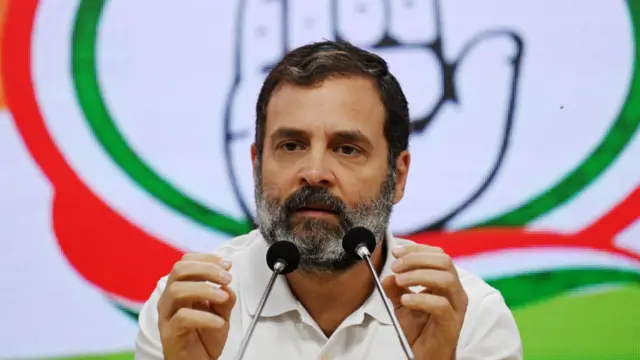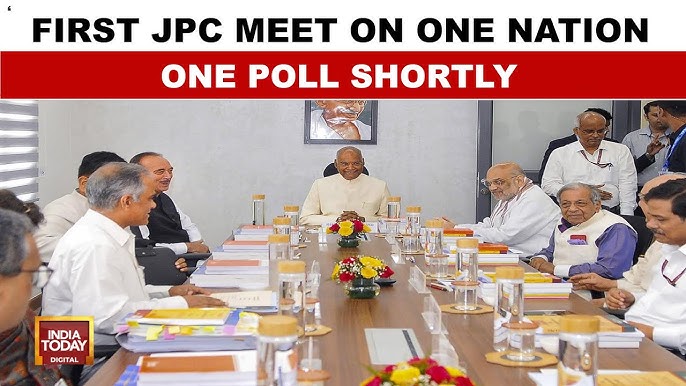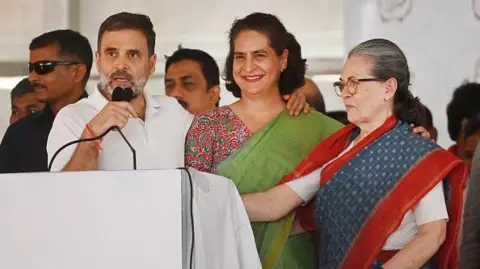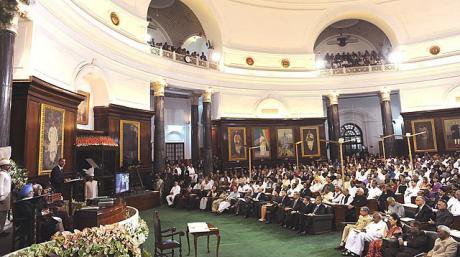In the realm of Indian politics, recent developments have sent ripples across the nation, particularly with regards to the Joint Parliamentary Committee (JPC) on the Prime Minister and Chief Ministers' removal bill. A significant turn of events has unfolded with the Trinamool Congress (TMC) and Samajwadi Party (SP) opting out of the JPC, sparking intense debate and speculation about the implications of a divided opposition. The JPC, constituted to deliberate on the proposed bill, aimed to establish a mechanism for the removal of the Prime Minister and Chief Ministers in the event of a no-confidence motion. The bill, if passed, would have far-reaching consequences for the country's political landscape. However, with TMC and SP's withdrawal from the committee, the proceedings have taken an unexpected turn. The decision of these two prominent opposition parties to opt out of the JPC has raised concerns about the unity and cohesion of the opposition bloc. This development is particularly significant, given the current political climate in India, where the ruling party has been facing intense scrutiny over various issues. A united opposition was seen as a beacon of hope for those seeking change, but the recent turn of events has cast a shadow of doubt over their ability to present a united front. Implications of a Divided Opposition
- Loss of bargaining power: With TMC and SP opting out of the JPC, the opposition's bargaining power has taken a hit. This could lead to a weakened stance on crucial issues, allowing the ruling party to dictate the agenda.
- Fragmentation of opposition votes: The division within the opposition ranks may lead to fragmentation of votes, ultimately benefiting the ruling party. This could have significant consequences in the upcoming elections.
- Undermining of democratic institutions: The withdrawal of TMC and SP from the JPC may be seen as an erosion of trust in democratic institutions. This could have long-term implications for the health of India's democracy.

The JPC on PM, CMs Removal Bill: Understanding the Context
- The opposition parties argued that the bill would help curb the authoritarian tendencies of the ruling party and promote a more inclusive and participatory form of governance.
- They also contended that the bill would ensure that the Prime Minister and Chief Ministers remain accountable to the people and are not shielded by their respective party's majority in the legislature.
- The opposition parties believed that the bill would pave the way for a more robust system of checks and balances, essential for a healthy democracy.

TMC and SP's Decision to Opt Out: Reasons and Implications
- Put aside their differences and present a united front on key issues.
- Engage in sustained protests and debates to highlight the flaws in the Personal Data Protection Bill.
- Push for a more inclusive and transparent committee process to ensure that the voices of all parties are heard.

Congress Stands Firm: A Beacon of Hope for Opposition Unity?
- Provide a credible alternative to the BJP's dominance, offering voters a real choice in elections
- Hold the government accountable for its actions, ensuring that it is transparent and accountable
- Push for legislation that benefits the common man, rather than catering solely to the interests of the ruling party
- Create a sense of stability and continuity, essential for attracting investment and promoting economic growth

The Bigger Picture: What Does This Mean for Indian Politics?
- Continued Dominance of the Ruling Party: With a weakened opposition, the ruling party may continue to hold power, potentially leading to a concentration of power and erosion of democratic institutions.
- Rise of Regional Parties: The fragmentation of the opposition may lead to the emergence of regional parties as key players in Indian politics, potentially altering the electoral landscape and governance dynamics.
- Coalition Governments: In the absence of a clear majority, coalition governments may become the norm, leading to unstable and short-lived governments that struggle to implement policy reforms.
- Increased Political Instability: A divided opposition can lead to increased political instability, potentially resulting in frequent elections, horse-trading, and political uncertainty.
- Building Consensus: Opposition parties must engage in dialogue and build consensus on key issues, such as economic development, social justice, and democratic institutions.
- Forging Alliances: Strategic alliances between opposition parties can help create a strong, unified front against the ruling party.
- Reforming Internal Structures: Opposition parties must reform their internal structures, ensuring greater transparency, accountability, and democratization.
- Engaging with Citizens: Opposition parties must engage with citizens, listening to their concerns and aspirations, and providing a viable alternative to the ruling party.

Frequently Asked Questions (FAQ)
What is the PM, CMs removal bill, and why is it significant?
Introduction In a democracy, holding elected officials accountable is crucial for ensuring that power is exercised responsibly and in the best interests of the people. One of the most critical aspects of governance is the removal of top officials, including the Prime Minister and Chief Ministers, who fail to discharge their duties effectively or engage in corrupt practices. To address this, a bill has been proposed to establish a process for the removal of these high-ranking officials, promoting accountability in governance. The Need for Removal The absence of a clear process for removing the Prime Minister and Chief Ministers has led to instances of abuse of power, corruption, and misgovernance. In the past, there have been cases where these officials have been accused of wrongdoing, but lacked accountability due to the lack of a clear removal process. This has undermined trust in the system and eroded faith in democratic institutions. The proposed bill aims to fill this gap and ensure that those in power are held accountable for their actions. Key Provisions of the Bill The PM, CMs removal bill proposes the following key provisions:
- Establishment of a Removal Process**: The bill outlines a clear process for the removal of the Prime Minister and Chief Ministers, including the grounds for removal, the procedure for initiating removal proceedings, and the role of the legislature and judiciary in the process.
- Grounds for Removal**: The bill specifies the grounds on which the Prime Minister and Chief Ministers can be removed, including corruption, abuse of power, and failure to act in the public interest.
- Role of the Legislature**: The bill empowers the legislature to initiate removal proceedings against the Prime Minister and Chief Ministers, ensuring that elected representatives have a say in holding these officials accountable.
- Judicial Oversight**: The bill provides for judicial oversight of the removal process, ensuring that the process is fair, transparent, and in accordance with the Constitution.
- Promoting Accountability**: The bill promotes accountability in governance by providing a clear process for removing officials who fail to discharge their duties or engage in wrongdoing.
- Strengthening Democracy**: By empowering the legislature and judiciary to hold the Prime Minister and Chief Ministers accountable, the bill strengthens democratic institutions and reinforces the principles of accountability and transparency.
- Enhancing Trust**: The bill helps to enhance trust in the system by providing a clear mechanism for addressing instances of abuse of power and corruption, thereby restoring faith in democratic institutions.
What are the potential consequences of a divided opposition on Indian politics?
The Indian political landscape has witnessed a significant shift in recent years, with the opposition forces failing to present a united front against the ruling party. This fragmentation has far-reaching consequences, threatening the very fabric of India's democratic system. A unified opposition is essential in a democratic setup, as it provides a collective voice that can hold the ruling party accountable for its actions. However, a divided opposition can lead to a weakened collective voice, allowing the ruling party to dominate the political narrative and push through its agenda with relative ease. This can result in a lack of effective oversight, enabling the ruling party to act with impunity and undermining the democratic checks and balances that are essential for a healthy democracy. One of the primary consequences of a divided opposition is the inability to present a credible alternative to the ruling party. When opposition parties are at loggerheads, they fail to project a unified vision for the country, making it difficult for voters to rally behind them. This creates a power vacuum, which the ruling party can exploit to its advantage, consolidating its grip on power and further marginalizing the opposition. Furthermore, a divided opposition can also lead to a lack of coordination on key policy issues. When opposition parties are unable to present a united front on critical issues, they fail to provide a coherent alternative to the ruling party's policies. This can result in a lack of effective opposition to the ruling party's agenda, allowing it to push through controversial legislation and policies with minimal resistance. The consequences of a divided opposition can be far-reaching and have a significant impact on the country's political landscape. Some of the potential consequences include:
- Consolidation of power: A divided opposition can enable the ruling party to consolidate its power, leading to a decline in democratic accountability and an erosion of checks and balances.
- Undermining of institutions: A weakened opposition can lead to the undermining of democratic institutions, such as the judiciary, the media, and civil society, which are essential for a healthy democracy.
- Polarization and social unrest: A divided opposition can lead to increased polarization and social unrest, as different groups and communities are pitted against each other, creating an environment of mistrust and hostility.
- Loss of faith in democracy: A divided opposition can lead to a loss of faith in the democratic system, as citizens become disillusioned with the ability of the opposition to provide an effective alternative to the ruling party.
Can the Congress party single-handedly revive opposition unity?
Reviving Opposition Unity: A Collective Effort Beyond Congress's Reach? The Indian opposition's struggle to present a united front against the ruling Bharatiya Janata Party (BJP) has been a subject of much debate and discussion. Amidst this backdrop, the Congress party's recent decision to participate in the Joint Parliamentary Committee (JPC) on the Personal Data Protection Bill has sparked hope of a possible revival of opposition unity. While this move is undoubtedly a positive step, the question remains: can the Congress party single-handedly revive opposition unity? The Need for Collective Effort The answer, quite simply, is no. Reviving opposition unity will require a collective effort and cooperation among all opposition parties. The Congress party, despite being one of the largest and most prominent opposition parties, cannot shoulder the responsibility alone. The opposition bloc comprises diverse parties with varying ideologies, interests, and strengths. To present a united front, these parties must work together, putting aside their differences and rivalries. Challenges to Opposition Unity The road to opposition unity is fraught with challenges. Some of the key hurdles include:
- Ideological differences: Opposition parties have distinct ideologies, which often lead to conflicting views on critical issues. Bridging these gaps will be essential to presenting a united front.
- Regional rivalries: Regional parties often have competing interests, making it difficult to find common ground. Overcoming these rivalries will be crucial to fostering cooperation.
- Lack of trust: The absence of trust among opposition parties is a significant obstacle to unity. Building trust through open communication and cooperation will be vital.
- Regular dialogue: Open and regular communication among opposition parties can help build trust and foster cooperation.
- Issue-based alliances: Opposition parties can form alliances on specific issues, allowing them to present a united front on critical matters.
- Flexible leadership: Opposition parties must be willing to accommodate each other's concerns and interests, demonstrating flexibility in their approach to leadership.
Promoted
Massive ROI on Your Career: Resume Bundle for Only ₹99
A winning resume is worth thousands in salary. Our bundle of 4,400+ templates costs just ₹99. The ROI is massive.
🔥 Get Lifetime Access Now 🔥
